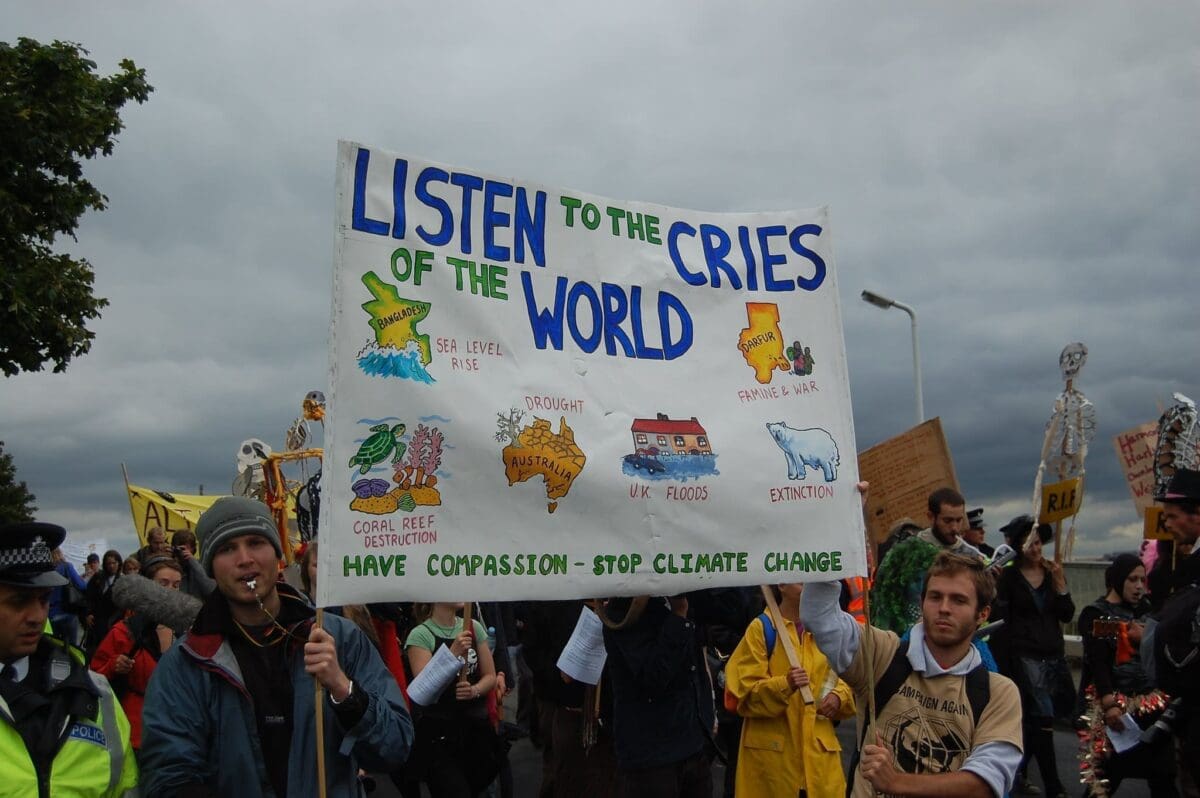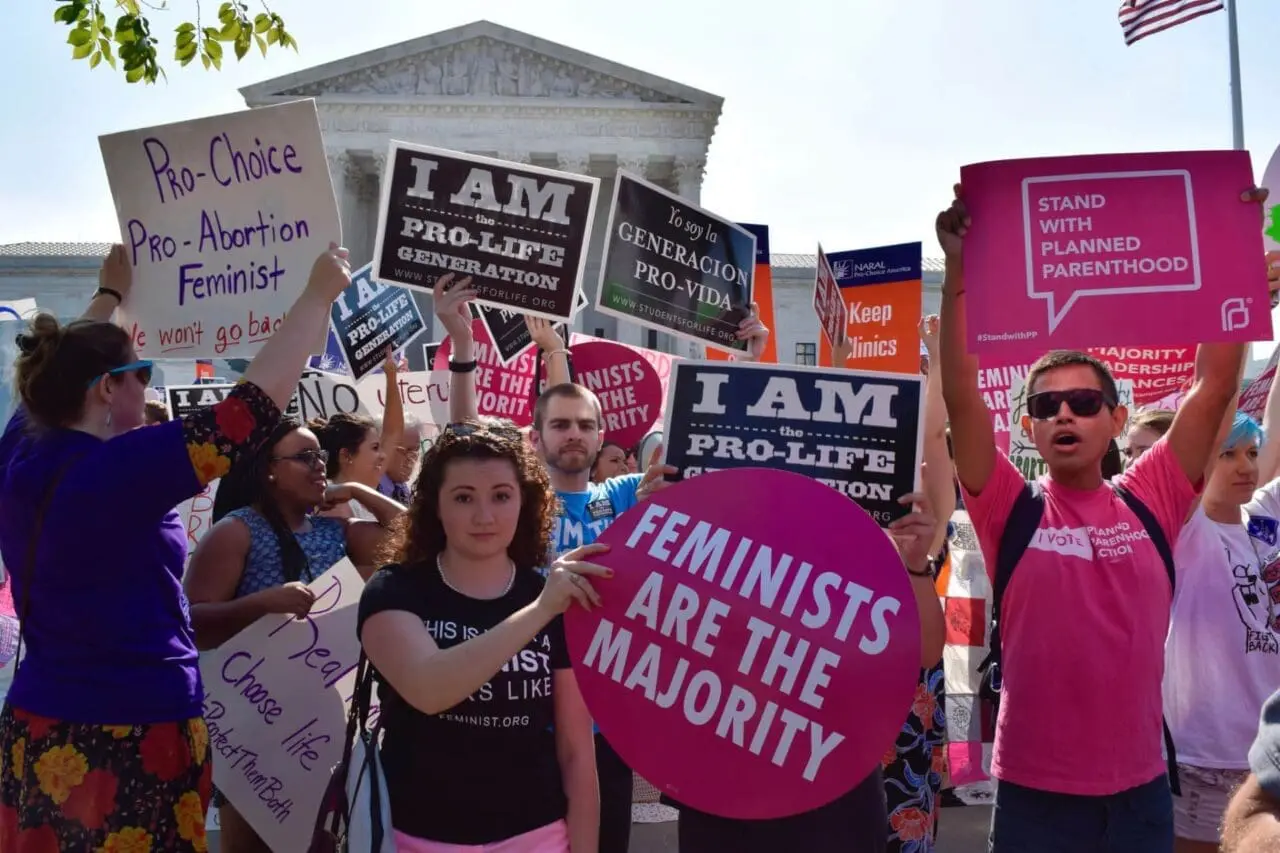Editor: Have you ever heard of the Evangelical Environmental Network (EEN)? Me neither…before today. Evangelical and climate activism are in the dictionary as an example of antonyms. (Not really. Don’t sue me for providing misinformation.) This article from Inside News is an interesting read. Enjoy!
This article was co-published with Inside Climate News as part of The 19th News Network’s Abortion on the Ballot series.
As a teenager in eastern Tennessee, Jessica Moerman didn’t think she could be both a scientist and a Christian.
An evangelical who grew up in the foothills of the Great Smoky mountains, Moerman was “spoiled with the grandeur of God’s creation,” and remembers learning about nature and conservation from her father, a hunter. It helped fuel her deep interest in environmental science, but that felt at odds with her goal of going into the ministry.
“This is what I think a lot of evangelicals feel,” Moerman said. “A general perception of a conflict between science and faith, which is absolutely a false choice.”
Two decades later, Moerman is a reverend with a Ph.D. in earth and atmospheric sciences and is president of the Evangelical Environmental Network (EEN), an organization working to mobilize evangelicals to advocate for climate and environmental issues like reducing methane pollution and transitioning the energy grid to renewable energy. EEN sees environmental advocacy as a “Biblical mandate to care for creation.” The group heavily emphasizes pollution’s impact on pregnancies, and is part of a minority of Christian groups that are attempting to expand the definition of “pro-life” to include not only opposition to abortion but also advocacy against the harm and suffering that climate change is causing for humans and the natural world.
“For far too long, addressing climate has been perceived as a partisan political issue,” Moerman said. “For us as evangelicals, this is very much, at the root of it, a faith issue…to be good stewards of God’s creation, and that also intersects with, as pro-life Christians, our commitment to defending life from all harms.”
The grouping of anti-abortion and climate advocacy under an expanded “pro-life” umbrella — part of what some activists call a “womb-to-tomb” valuing of human life — is not a particularly new phenomenon, but in the United States, where environmentalism and evangelical Christianity are often seen as politically incongruent, it still occupies a relatively small niche.
Moerman believes the intersection is growing, and sees the ideology as a way to bridge political divides.
But it remains a controversial connection. Some reproductive justice advocates criticize the use of womb-to-tomb rhetoric in opposing abortion rights, pointing out racial and socioeconomic disparities in healthcare that the framing leaves unaddressed; its threats to bodily autonomy; and impacts of abortion bans like the criminalization of reproductive healthcare, deterrents for medical professionals providing life-saving care and potential increases in maternal mortality. Some other Christian, anti-abortion conservatives criticize groups like the EEN for supporting alternatives to the continued development and use of fossil fuels, and argue that “pro-life” should refer to abortion alone.
Meanwhile, some younger evangelical activists are ditching the issue of abortion entirely and focusing only on climate and the environment, possibly reflecting a generational shift in priorities and a broadening base for the environmental movement.
Shifting priorities

Both abortion and climate are polarizing in this year’s election. According to September polling by the Pew Research Center, 51 percent of voters rank abortion as a “very important” issue that will impact their vote in the upcoming presidential election, and 37 percent of voters put climate change in the same category.
Evangelical protestants are the most climate skeptical of all major U.S. religious groups: 2022 polling found that while 53 percent of Americans believe global warming is caused mostly by human activity, only 32 percent of evangelical protestants agree. Thirty-six percent of evangelicals say it’s mostly due to natural patterns, and another 32 percent say they’re not convinced that the Earth is warming at all.
Meanwhile, White evangelical protestants are also particularly passionate about restricting abortion, with 73 percent believing it should be illegal in most or all cases, compared with just 33 percent of White non-evangelical protestants, 26 percent of Black protestants and 13 percent of religiously unaffiliated respondents holding those views.
As the climate crisis intensifies and its impacts are felt by more communities across the United States, Moerman sees “pro-life” rhetoric as a way to bring conservative evangelicals into the climate movement and fight decades of environmental disinformation and political polarization that have kept them away.
“As we look at extreme weather that just simply is unnatural and not normal…we’re beginning to see that happen in our homes, in our neighborhoods, in our communities, [and] people are beginning to say something’s not right,” Moerman said. The increasing visibility of climate change is “opening up hearts and minds to look at things afresh and really question that disinformation.”
EEN focuses on raising awareness in conservative Christian communities about climate and environmental issues like microplastics and methane, and advocates for what it sees as climate and conservation aspects of legislation like the 2023 farm bill, the sprawling legislation covering nutrition and farm programs that is renegotiated in Congress every five years. The group is staunchly anti-abortion, and its website is full of references to pollution’s impact on “the unborn.” But the group does not engage in legislative advocacy on abortion, Moerman said.
EEN also has a youth-focused outgrowth organization, Young Evangelicals for Climate Action (YECA). Through outreach to youth, particularly on Christian college campuses, YECA focuses exclusively on environmental stewardship and is calling on young evangelicals to “vote with climate in mind.” Unlike its parent organization, the youth group has no public position on abortion, although it also does not endorse political candidates.
Lauren Kim, a national organizer for YECA, said that for her, being “pro-life” is not about abortion.
“If we really think about what the meaning of ‘pro-life’ is outside of the United States political construct….it really does mean, at the heart of it, caring for the environment, because you love your neighbor and you want the best for their health and well being,” Kim said.
The group’s distancing of itself from abortion lines up with a shift in priorities among younger evangelicals, who are more pro-environment and less anti-abortion than their older counterparts.
Former YECA spokesperson Reverend Kyle Meyaard-Schaap — now a climate advocate and executive director of the Association for a More Just Society, a Christian organization that does social justice work in Honduras — believes abortion should be legal. He said that he feels that the term “pro-life,” has been successful branding for the anti-abortion movement, but a truly pro-life movement would have to advocate for other life-or-death issues like an end to the death penalty or — his focus — climate and environmental justice.
“It feels like a no-brainer, [but] it is a connection that is not particularly prevalent, and I think that’s largely because the pro-life movement for so long has been so laser focused on abortion rather than actually on all of the ways in which life is supported and sustained,” Meyaard-Schaap said.
The rise of abortion as a rallying cry for the religious right has been studied by historians like Dartmouth College’s Randall Balmer, who argues that evangelicals’ political fervor around abortion actually stemmed from early opposition to racial integration. Balmer writes about some fundamentalist Christian colleges that refused to integrate after the end of Jim Crow, and, after going back and forth with the Internal Revenue Service, lost their tax-exempt status. Balmer writes that this politicized some church and university leaders against government interference, but that the wider evangelical community was not heavily involved in politics. Groups like the Heritage Foundation began working with church leadership to galvanize Christian support for right-wing politics, and found abortion to be an easier moral sell than opposition to integration, Balmer argues.
Eventually, conservative activists used Jimmy Carter’s refusal to push for a constitutional amendment banning abortion to help shore up evangelical support for Ronald Reagan in 1980.
Now, Balmer sees the legacy of that political maneuvering in the lasting religious zeal around restricting abortion.
Meyaard-Schaap sees growing nuance among conservative Christians on the issue of abortion, but noted that with the issue remaining politically polarized, there’s a fear in Christian leadership of being perceived as anything less than completely anti-abortion, possibly partially due to concerns about alienating funders.
“Angering donors is a real problem for a lot of church leaders and for a lot of Christian nonprofit leaders,” Meyaard-Schaap said. “So I think that’s always in the back of people’s minds.”
Meyaard-Schaap said he would encourage Christian voters who feel like they are juggling seemingly competing concerns like opposing abortion rights but supporting environmental action to vote their conscience and recognize that politics is not about perfect choices.
He doesn’t want to tell other Christians what to do, but he’ll be voting for Kamala Harris.
“Trump is a disaster for the climate,” he said. “If you’re going to vote with the climate as your primary motivator…it’s hard to justify voting for Donald Trump.”
Dan Misleh, executive director of the Catholic Climate Covenant, a group focused on mobilizing the U.S. Catholic community for climate justice, said that his organization doesn’t endorse political candidates, but that he is encouraging community members to bring environmental issues into the voting booth along with other values, like the character of the candidates.
Misleh has also outlined key differences in the candidates’ environmental records and spoken publicly about how the Trump administration’s rollbacks of environmental regulations “stunted” crucial climate action while the Biden administration made record investments in clean energy and environmental justice.
“They’re not going to agree with everything that the church believes,” Misleh said. “But ultimately, you’re going to have to make a choice, and we all need to participate in the public process…it’s a political obligation but it’s also an obligation to us as Catholics to go and help make the society, make the world a better place.”
Pushback against the abortion-climate connection

Not all anti-abortion groups that claim to promote caring for the planet favor climate action. The Cornwall Alliance for the Stewardship of Creation, an evangelical Christian group that brands itself as dedicated to education on “Biblical earth stewardship,” staunchly opposes the use of “pro-life” rhetoric to promote environmental causes and supports continued development and expansion of fossil fuels. The group is a frequent espouser of climate denial and misinformation.
Calvin Beisner, president of the Cornwall Alliance, declined an interview but wrote over email that applying the “pro-life” label to environmental issues conflates what he sees as “intentional” harm, like abortion, with “unintentional” harm, like climate degradation. Beisner, on behalf of the Cornwall Alliance, was among a group of 44 signees on a letter in 2017 supported by fossil fuel-industry funded groups like the Heritage Foundation, the Heartland Institute and the CO2 Coalition urging President Donald Trump to withdraw from the Paris Agreement.
Beisner is an author at the Acton Institute for the Study of Religion and Liberty, which is a member of the Atlas Network, a web of conservative think tanks with deep fossil fuel industry ties. Beisner and the Cornwall Alliance are also frequent collaborators with the Heartland Institute and Heritage Foundation, two conservative groups accused of distributing climate disinformation.
Beisner, who has circulated petitions opposing the EEN’s campaign for states to commit to transitioning to clean energy, has also said that the harms of climate change will be outweighed by the benefits of fossil fuel development.
“Life is full of unavoidable tradeoffs,” Beisner wrote. “Whatever human mortality results from climate change must be weighed against human lives prolonged and enriched by the benefits of fossil fuels and nitrous fertilizer-enhanced crop yields; the latter far outweigh the former.”
Internationally, the World Health Organization conservatively estimates that climate change will cause 250,000 additional deaths annually from 2030 to 2050, and UNICEF already reports 43.1 million displacements of children within the countries where they live due to weather-related disasters between 2016 and 2021, an equivalent of 20,000 displacements per day.
Jade Sasser, a gender and sexuality professor at the University of California, Riverside, whose research focuses on climate and reproductive justice, has a different problem with the use of anti-abortion rhetoric for environmental advocacy.
Sasser says that inherent to the pursuit of climate justice is a need to look at systemic inequities in rights and access that cause climate change to impact different populations unequally.
“The kinds of rights and access that climate justice activists are promoting [are] along the lines of race and class, communities that are already here and suffering, that are already unequally able to access the kinds of protections that they need and that are unevenly impacted by climate impacts,” Sasser said. “This issue of fetuses having particular kinds of rights that otherwise belong to human beings that are not in wombs, that doesn’t track.”
In the U.S., communities of color are disproportionately endangered by abortion bans, and face greater barriers in access to abortion and contraceptive healthcare, according to research from the Guttmacher Institute, the National Partnership for Women and Families and others. Researchers found that legal abortion reduced non-white maternal deaths by 30 to 40 percent in the first year after Roe v. Wade. Since the ruling was overturned, state abortion bans have led to at least two reported preventable deaths, and many medical professionals believe the problem is more pervasive. People of color have also been disproportionately targeted by population control tactics like forced or coercive sterilization.
For Sasser, advocating to reduce the number of people on the planet in the name of climate change — as some environmental activists have done — and demands to restrict abortion rights, are both ways of pushing for population control, even if they have different goals. And both are likely to cause particular harm to people of color.
“Population control is any kind of top down coercive effort to manipulate the size or growth or movement of a population,” Sasser said. “The control comes from the coercion, the lack of full autonomous agency over one’s body and reproduction.”
Environmentalism as a tool

While the EEN focuses on faith-based arguments to connect abortion with the environment, some others take a different approach to the connection, characterizing environmental regulations as a means to an end for restricting abortion access.
Students for Life, a prominent pro-life group that describes its goal as “abolition” of abortion, made headlines since 2022 for filing citizen petitions — precursors to legal action — with the Food and Drug Administration to require doctors prescribing pills for medication abortions to take responsibility for disposing of fetal tissue, and to investigate whether trace amounts of the drug mifepristone, one of the pills typically used in the procedure, might threaten endangered species and habitats under the Endangered Species Act.
This year, the group wrote a letter to the Environmental Protection Agency, calling for regulation of mifepristone by comparing the drug’s impact on waterways to that of forever chemicals.
“Even if you support abortion, that is not an argument in favor of abortion water pollution,” said Kristi Hamrick, vice president of media and policy at Students for Life.
She also clarified that the group isn’t organizing for broader environmental regulations on contamination from prescription drugs, and is focused solely on abortion drugs.
“We’re a pro-life group,” she said. “There are all kinds of organizations out there looking at other issues.”
According to its tax filings, Students for Life has an annual revenue of more than $14 million, and the co-chairman of its board is Leonard Leo, a right-wing political operative who has been credited as the architect of the conservative Supreme Court and who has helped fund and coordinate efforts to block climate laws and defend fossil fuel interests.
Environmental scientists have condemned Students for Life’s campaign, saying that there is no evidence to suggest that medication abortion pills pose a significant or specific environmental threat.
Nathan Donley, the environmental health science director at the Center for Biological Diversity, said the comparison between mifepristone and PFAS — a contaminant that is found in 97 percent of the U.S. population’s bloodstreams — is “utterly absurd.” Students for Life’s effort seeks to divert EPA attention from important environmental health risks, he said.
“It’s hard not to see through this cynical attempt to limit reproductive rights when it wouldn’t do a darn thing to protect people from chemical contaminants in our waterways,” Donley said. “We have serious problems in this country with chemical contamination from largely unregulated industries…To try and compare that to a pharmaceutical drug that is taken by a tiny sliver of the population is stupid and dangerous.”
This post contains content that was first published on 19th News and republished here under a Creative Commons License. Read the original article.









